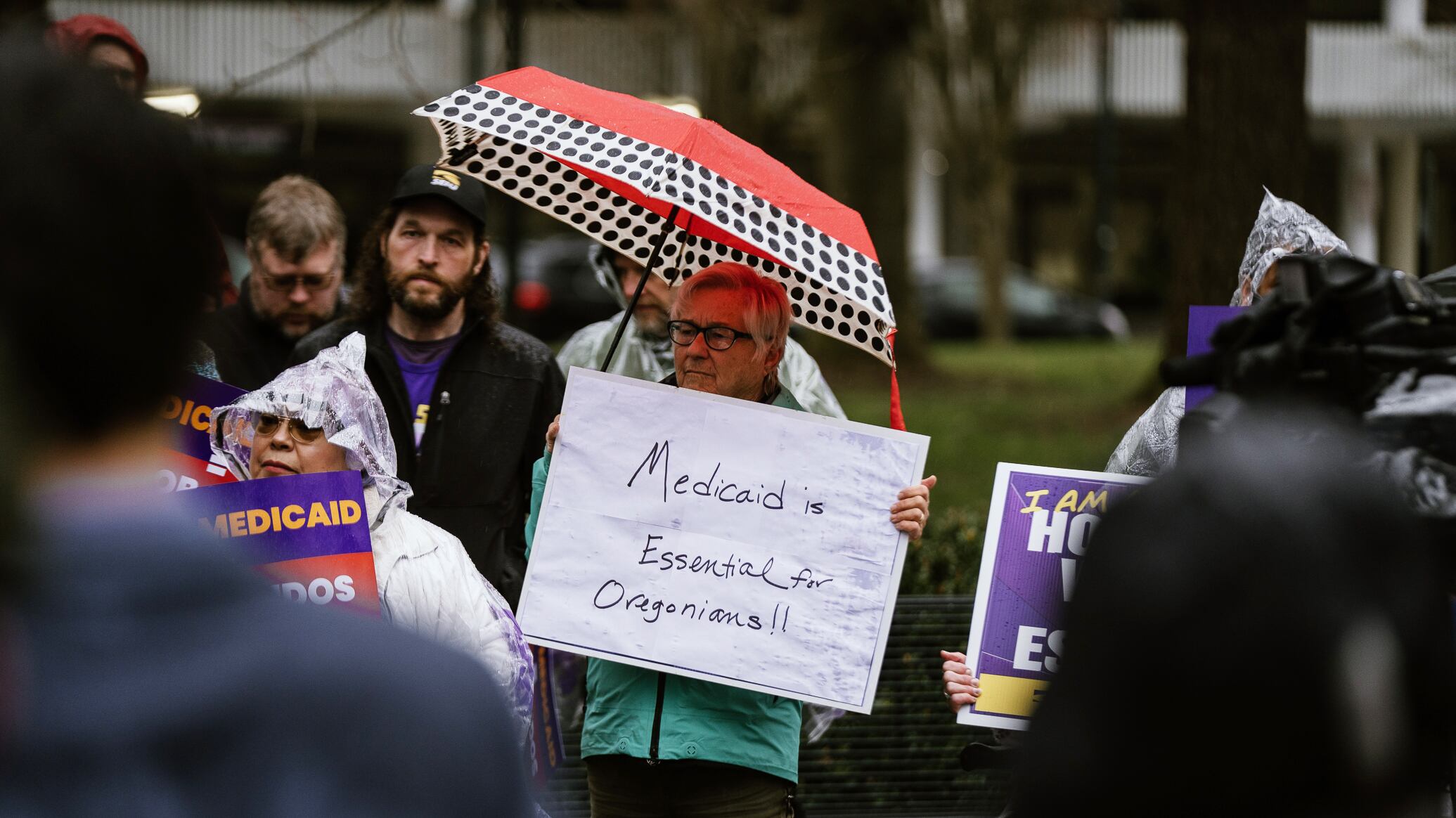This story was produced by the Oregon Journalism Project, a nonprofit newsroom covering the state.
On May 22, the U.S. House passed what it called the “One Big Beautiful Bill Act”—more than 1,100 pages of ideas President Donald Trump hopes will become law. Many of the concepts, including lower taxes for the wealthiest Americans and fewer benefits for the poorest, will affect residents of all 50 states.
But a section of the bill—one that concerns providing health insurance to undocumented immigrants—pits the president and his supporters against a principle central to the ideals of Oregon Democrats. And if the bill passes the Senate in its current form, those values could prove extraordinarily costly to Oregonians.
The principle at stake: the commitment to the rights of undocumented immigrants, a cause for which some Oregonians regularly march through the streets, and to which lammakers in Salem have long provided far more than lip service.
Oregon became the nation’s first sanctuary state in 1987, in effect divorcing state and local law enforcement agencies from federal immigration laws. In 2021, lawmakers took a step further, passing, on a party-line vote, House Bill 3352, which made Oregon the first state to offer free health care to all undocumented immigrants.
The cost of that commitment has, in just four years, risen to $1.5 billion for the 2025–27 biennium. For perspective, that’s about the same cost as the Oregon State Police and the Oregon Department of Forestry, combined. And if the Senate ratifies Trump’s bill, the state could see a loss of federal funds of more than three times that amount.
As a member of the Oregon House, now-U.S. Rep. Andrea Salinas (D-Ore.) was a chief sponsor of HB 3352 in 2021.
Last week, Salinas, the daughter of a Mexican immigrant father and the first person to represent Oregon’s new 6th Congressional District, voted against Trump’s bill. (It passed 215–214.)
In a statement to OJP, Salinas laid out the predicament Oregonian policymakers now face because of their principles.
“Republicans in Congress have put Oregon in an incredibly difficult position by threatening to reduce Medicaid match dollars if our state continues to provide coverage for noncitizens,” Salinas said.
“Losing federal match funding for Medicaid, also known as the Oregon Health Plan, would be catastrophic,” Salinas added. “Oregon simply cannot afford the consequences of going without these federal match dollars.”

Oregon has long been one of the states most aggressive and creative in leveraging federal matching dollars through the Medicaid program, which provides health care for people with low incomes.
Currently, according to state figures, 1.45 million Oregonians get their health care through the Oregon Health Plan, Oregon’s Medicaid program. The program covers 34% of the state’s population and 59% of Oregon children. Federal funds provide more than two-thirds of the money for that coverage.
Oregon, California and Minnesota are the only three states that currently provide publicly funded health care to any undocumented immigrant who wants it. Even before Trump’s bill passed last week, National Public Radio reported that California and Minnesota were moving toward reducing funding for their programs as both face budget crunches.
Prior to the bill’s passage, Gov. Tina Kotek told the Oregon Journalism Project she was disinclined to make similar cuts, even though the cost of the Healthier Oregon program, as the Oregon Health Authority calls insurance for undocumented immigrants, has skyrocketed.
“When someone doesn’t have health insurance, they’re going to still seek health care, often in the emergency department,” Kotek said then. “Those costs are either borne by the hospital or borne by other folks who have private-pay insurance. The cost will go somewhere. When everybody is insured, it helps keep costs down and reasonable for everyone.”
Lawmakers capped spending on the program at $100 million for 2022–23, the first year it operated. In July 2023, Oregon opened enrollment to all applicants, who now number more than 105,000. If nothing changes, according to the Legislative Fiscal Office, the cost of Healthier Oregon in the 2025–27 budget cycle will be $1.5 billion, 87% of it from the state’s discretionary general fund, and 13% from the feds. (Even before Trump’s election, Uncle Sam provided only limited matching funds for undocumented immigrants.)
Although top Democrats, including Gov. Kotek and House Speaker Julie Fahey (D-Eugene), say covering undocumented immigrants is both a reflection of Oregon’s values and the most efficient way to provide coverage, Republicans balk at the cost to the general fund.
“I look at the program and think that state funding could be used for U.S. citizens in our state who are struggling to get basic services: children and seniors, people with disabilities—there are a lot of people who aren’t getting served,” says state Rep. Ed Diehl (R-Scio), vice-chair of the Joint Ways and Means Committee’s Subcommittee on Human Services, which oversees OHA’s budget.
As written, Trump’s Big Beautiful Bill cuts Medicaid spending overall, but it singles out states that provide health care to undocumented immigrants for even deeper cuts. The nonprofit health care think tank KFF estimates such targeted cuts could cost Oregon $5 billion over the next decade. To be clear, those cuts would come almost entirely from programs for Oregonians here legally, not from Healthier Oregon. That’s a powerful lever.
On May 23, the day after Trump’s bill passed the House, Fahey told OJP the threat put her and her colleagues in a terrible predicament. Prior to the bill’s passage, Fahey says, she had no interest in trimming Healthier Oregon. “Our budgets are about our priorities,” she says.
But protecting a program that serves more than 100,000 undocumented immigrants could gut the Oregon Health Plan, which serves more than 12 times that many people. “The overall health care system depends on federal dollars,” Fahey says. That includes hospitals and clinics that rely on Medicaid. Any decision that we make will be made in the overall picture for Medicaid.”
Trump’s bill now moves to the Senate, where Republican leaders say they hope to amend and vote on it before July 4.
This reporting is supported by the Heatherington Foundation for Innovation and Education in Health Care.

